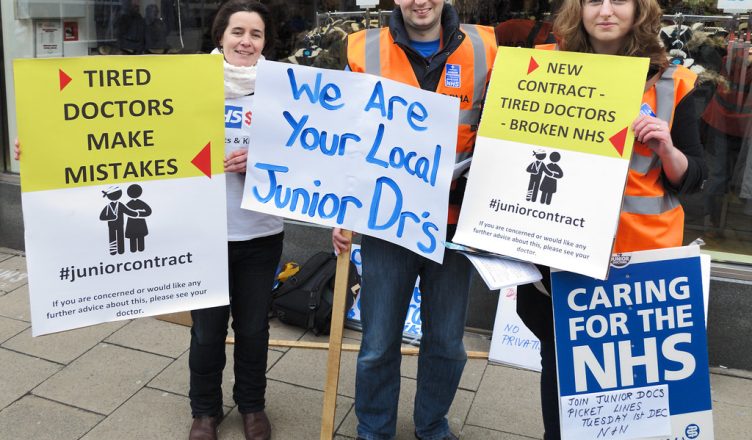Junior doctors in England pursued their demands for a 35% pay rise by coming out on the longest strike in NHS history, starting on January 4th and due to end on January 9th. From the start picket lines have been supported by other workers in the NHS, coming out in their breaks.
Meanwhile Rishi Sunak and other ministers queued up to condemn the strike, whilst the government refused to have talks with the junior doctors whilst strikes were on. Former Health Secretary and now Environment Secretary Steve Barclay brought out the old chestnut of the strike being “politically motivated,” an old standby for politicians, going back to Harold Wilson’s condemnation of striking seafarers in the 1960s.
Junior doctors in Wales are set to join the strike movement for a 72 hour strike on January 15th, with 3,000 due to come out after a massive vote in favour of strike action. Senior doctors in Wales are also balloting for strike action.
Junior doctors work extremely long hours, meaning they are working at below the basic minimum wage. They have seen their pay cut but almost a third in the last ten years.
The strike is more than about doctors’ salaries. There is widespread dissatisfaction at conditions in the NHS, rightly seen as at crisis point. Many junior doctors are forced to work extra overtime hours, and then have to chase management to actually get paid for these extra hours. These hours are often worked in hospitals where the quota of junior doctors is often half or more what it should be, putting extreme pressure on already overworked doctors. There is widespread contempt for senior managers in human resources and staffing, most of whom have no experience of clinical healthcare. There is also a widespread feeling that junior doctors should have more input in the running of the NHS and that widespread reforms need to be carried out within it.
The strike is also extremely important in indicating the increasing proletarianisation of groups of workers who have traditionally seen themselves as professionals and distinct from the mass of the working class. Worsening conditions, longer hours, and factory style management, more obsessed with targets and management of budgets, are beginning to change this, not just in the health service but in other sectors like education.
In Wales, the fight is not just with the Tory government in Westminster, but with the Labour government in Wales, who have offered a derisory rise of 5%. In both England and Wales, there is cynicism among some junior doctors that Labour, if elected, will be any different. They remember the moves to privatisation with previous Labour governments, the cutting of beds and the PFI schemes.
The worsening situation for junior doctors means that there is less access to the job for those of working class origin. The long hours and low pay mean that only those with access to financing can get into the profession. This at a time when more junior doctors are needed. In addition, the strict immigration rules mean that it is harder to recruit from abroad, putting even more pressure on the health service.
Much of the press are frothing at the mouth about the strike. For example, the London Evening Standard alleged that 337,000 appointments and operations in London had been cancelled because of the strike and that the pay demand was ‘unrealistic’. Meanwhile it carried a cartoon from the dire Christian Adams, depicting a crashed plane with the insignia NHS and the caption “ I know what will help- let’s go on strike.” This at a time when MPs are in line to receive a 7.1 pay increase, and when decades of austerity, cuts and privatisation have brought about the near-collapse of the NHS. The low pay, long hours, nasty management, and bad conditions have caused many working in the NHS to leave. The crisis in the NHS is caused, not by strikes, but by the many years of cuts and privatisation imposed by both Tory and Labour governments. The so called ‘winter crisis’ that happens every year is not caused by strikes but by these policies.
Workers in the NHS need to seriously look towards constructing committees in each hospital and clinic that includes all workers- whether they be doctors, radiographers, nurses, midwives, ambulance staff, porters, and other so-called ancillary or support staff. These committees need to include those who are in unions and those who are not, and to go beyond the false divisions between workers imposed by the unions. These committees should then look towards coordinated action in the health service, including united strike action. The hour is getting late, the NHS is on life support, and it is this kind of imaginative organisation and action that is now vitally necessary.
Photo: Creative Commons, photographer Roger Blackwell

